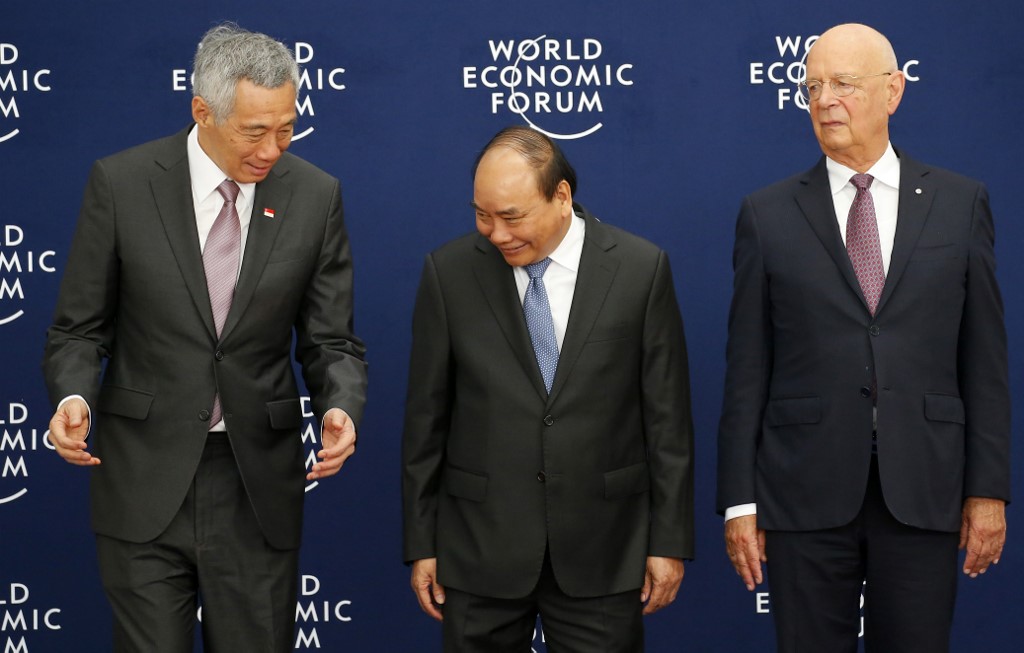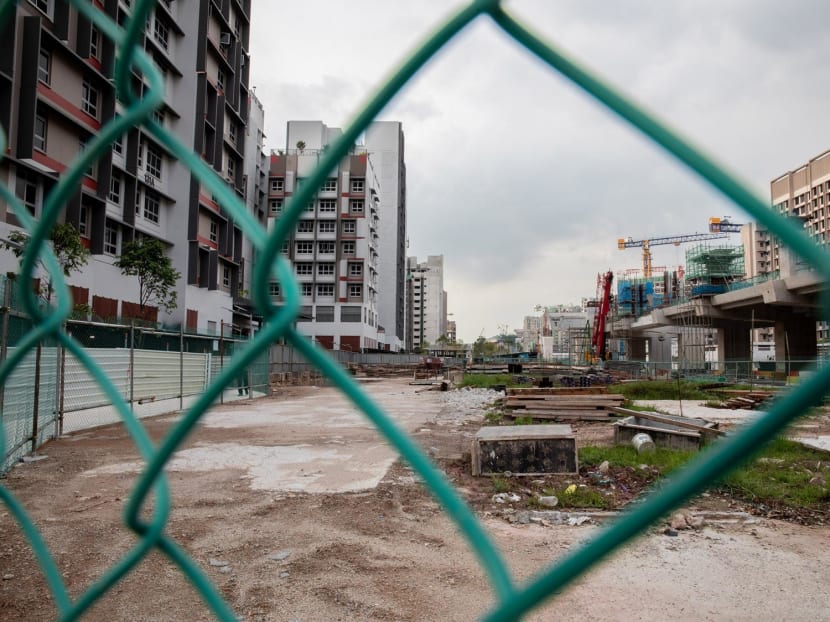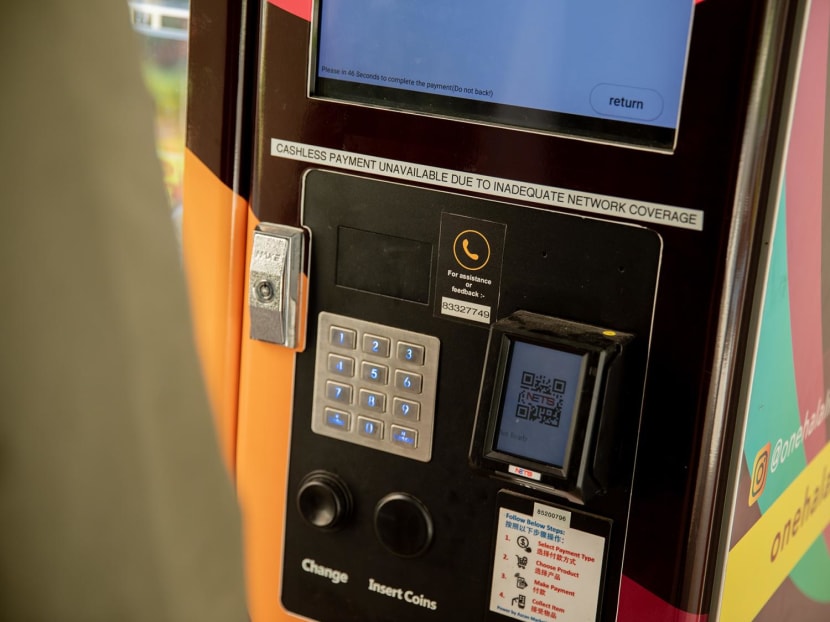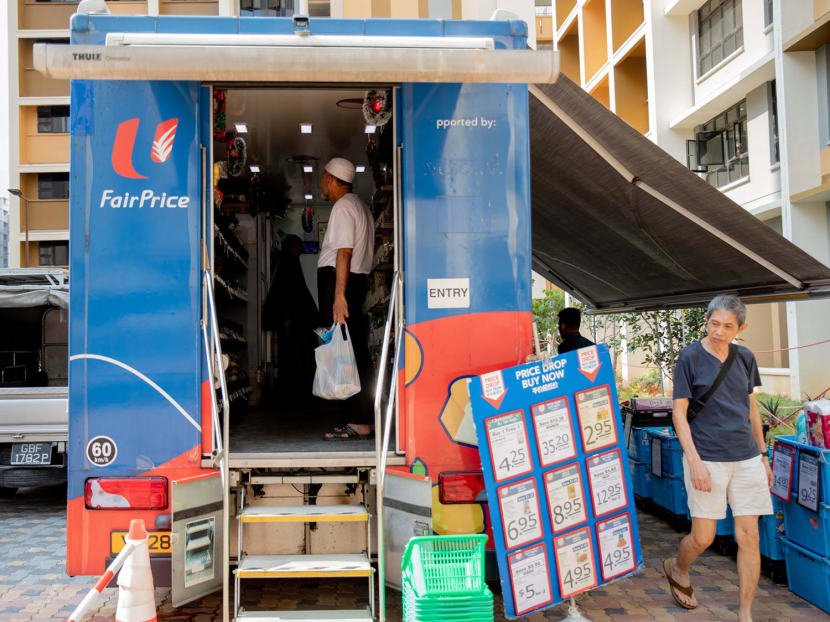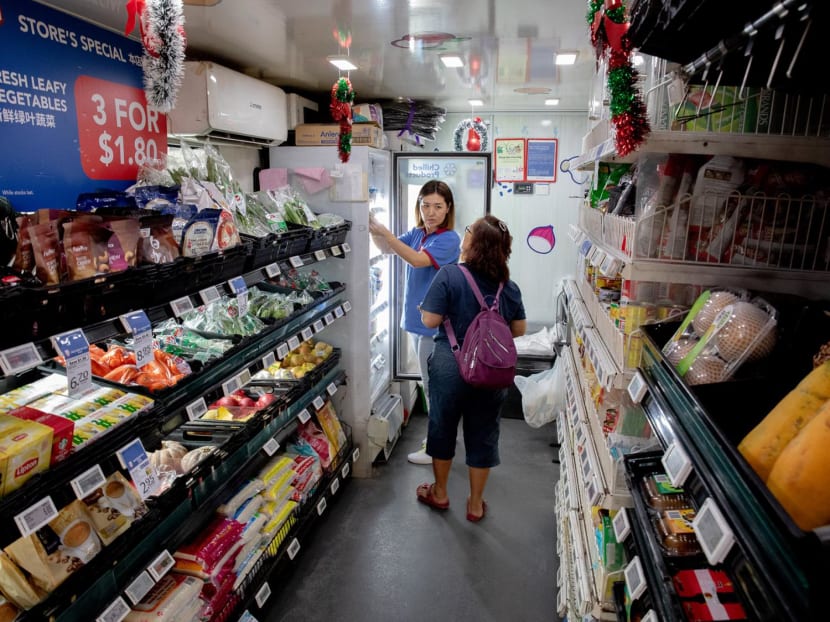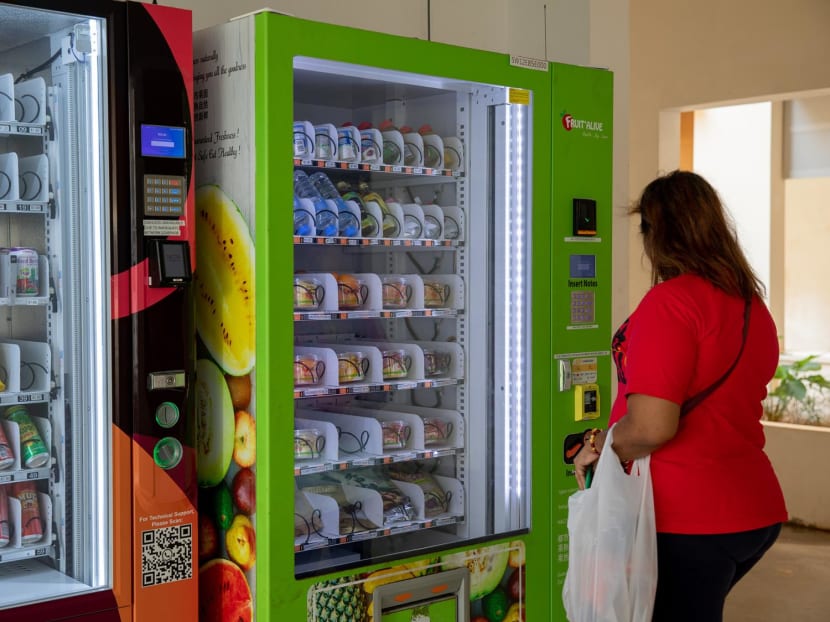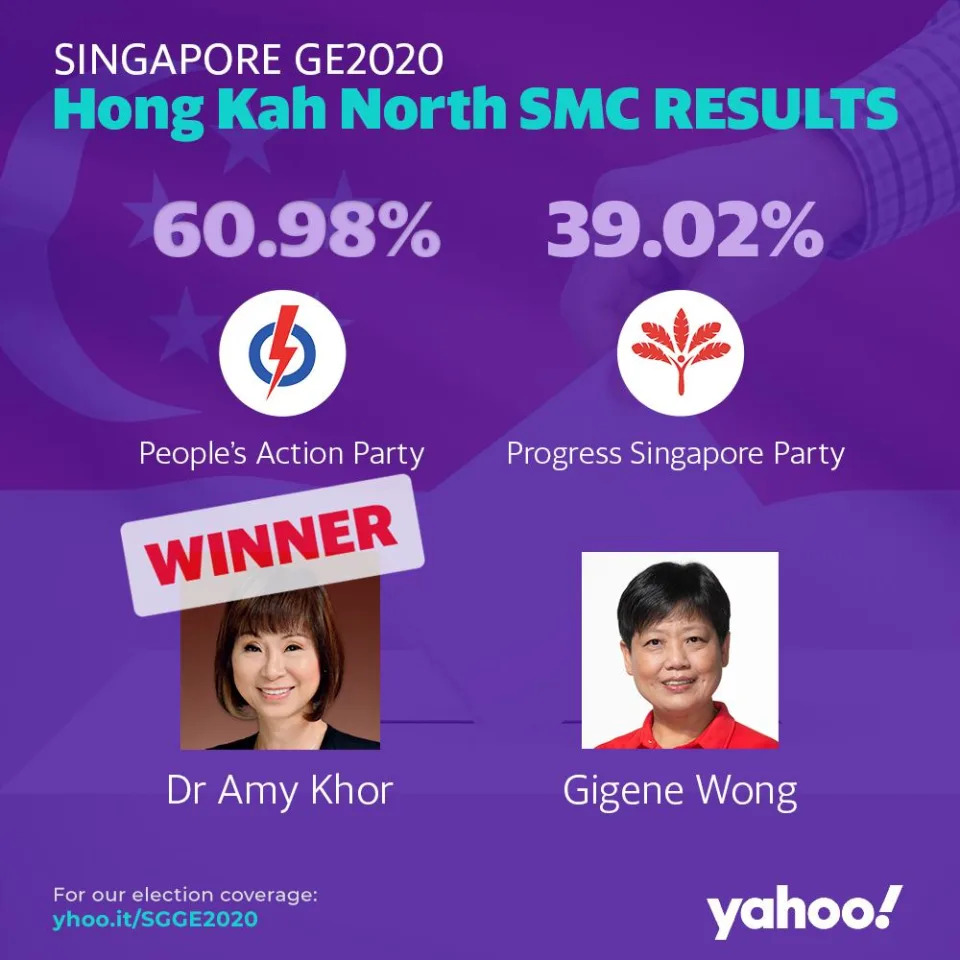- Joined
- Jul 18, 2014
- Messages
- 4,849
- Points
- 113
The problem is now worse than expected, forcing residents to pay up to $6000+ for cancellation of the cooling system, LMAO.
Now the whole project is so screwed up that more than 100 residents have to write petition to PMO office before SP Services can wake up their farking idea.
From misleading 30 precent electricity savings to now suddenly amended and drop to only "17 percent savings" with creative long-term calculations some more, LOL.
With all the ranjiao unsightly trunking, 30 mins delay in cooling etc , I think SP Group can take the so-called '17 % savings" and shove it in their ass.
From the looks of it, it is best that the whole freaking disgraceful project be stopped and all such ranjiao chiller trunkings and equipment be completely torn down and removed with all units with aircon retrofitted back with conventional aircon compressor and units all costs to be borne by SP Group for causing so much inconvenience to the residents and deceiving the public. They should also be fined significantly by HDB. HDB and the PCB PAP-Gov should also partly shoulder the blame. Minister in charge should also apologize to all the Tengah residents.
The common corridor fugly pipes can perhaps recover some monies as scrap metal, LOL.
https://www.todayonline.com/singapo...?cid=internal_inarticlelinks_web_18122023_tdy
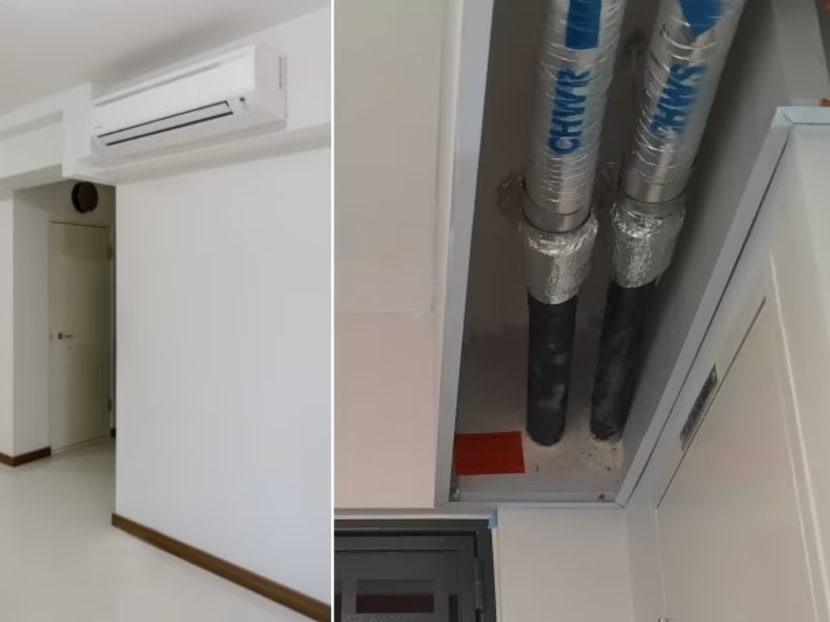
SP Group, CNA
The centralised cooling system in a four-room flat in Tengah (left), and the system's pipes running into a unit from the front door (right).
SINGAPORE — National grid operator SP Group said on Monday (Nov 6) that it will waive all centralised cooling system usage charges for Tengah homeowners till the end of this year and lower the usage rate from Jan 1, following a slew of complaints from residents.
In a “further gesture of goodwill”, homeowners who choose to cancel the installation of the system will only have to fork out half of the payment originally required, added SP Group.
In recent weeks, residents have written to the authorities and started an online petition about their concerns with the cost and management of the system, among other concerns.
A group of more than 100 residents sent a letter dated Oct 27 to the Prime Minister’s Office, expressing their "anxiety and disappointment over the issues" with the system. They detailed five key concerns: excessive charges, misleading advertisement and information, a lack of transparency, cancellation policy issues, and poor communication.
One of the main concerns included how the supposed cost savings from opting for the cooling system instead of conventional air conditioning appeared to be lower than what they were told.
They also pointed out that the current chilled water usage rate of S$0.2038 per kilowatt-hour refrigeration (kWrh) for October to November had increased compared to previous quarters. SP Group sets the chilled water usage rate of the cooling system, which is updated quarterly.
The residents asked for usage rates to be adjusted, or for fees to be completely waived for those looking to terminate their centralised cooling system contract.
Issues with the centralised cooling system, a sustainable alternative to air conditioning pioneered in the new Tengah housing estate, have cropped up since before residents began collecting their keys in end-August.
As of Nov 6, about 1,109 units out of 2,333 units in the first two Tengah projects — Plantation Acres and Plantation Grange — have collected their keys, said the Housing and Development Board (HDB) in response to CNA’s queries.
CNA earlier reported that homeowners found the trunking of the cooling system too bulky or unsightly. Others who began using the system found condensation or leakages, or that temperatures were not cold enough.
Unlike conventional air conditioning which uses refrigerants, the cooling system removes heat by piping chilled water into homes from centralised chillers on selected housing blocks. These pipes run through corridors and into each unit via the front door.
SP Group manages the sign-ups, installation and maintenance of the system and works with air-con manufacturer Daikin, which is responsible for installing indoor units, diagnosing and resolving reported issues.
While already adopted commercially, the cooling system is new to public housing and optional for homeowners. Residents can still choose to install conventional air-conditioning.
The option for centralised cooling is presented to new homeowners after they apply for their build-to-order flats. Homeowners will be given a tour of the MyTengah experience centre at HDB Hub, where they will be briefed on how the cooling system works and its benefits.
Upon signing a contract, homeowners would be given a 30-day cooling-off period, after which cancelling the contract would result in a 35 per cent penalty.
“Hence, as an additional goodwill gesture, SP will waive all centralised cooling system usage charges for Tengah customers during this interim period from now to Dec 31, 2023,” it said.
As for monthly usage charges, residents had pointed to various sources which advertised 30 per cent cost savings from using the cooling system compared to conventional air conditioning. These include the MyTengah website, which stated "30 per cent life cycle savings compared to conventional air-conditioning systems".
However the amount was recently amended to "17 per cent life cycle cost savings", upsetting residents.
Some took to a Telegram chat group to share cost estimates of their cooling system based on current usage rates, comparing them to data provided by brands of conventional air-conditioning systems.
They also noted that they have not been able to compare the full, sustained cost of using the centralised cooling system as SP Group had waived the chilled water charges from Oct 9 to Oct 31 during their checks.
Ms Chan Sze, who in her 30s and has a two-room flat in Plantation Grange, said that based on her meter readings so far, the cost of running the cooling system seemed "quite high".
"It ranges from about 2 kWrh to 4 kWrh per hour for my two-room flat (with one indoor unit), which is about S$0.45 to S$0.87 per hour. This is about the same as conventional (air conditioning) on the low end and almost twice as expensive on the high end."
Pointing out that cost savings had been marketed as 30 per cent, Ms Chan, who does administrative work, said: "It just feels (like) there is a mismatch of what we were sold and what (is) now received."
In their letter to the Prime Minister, residents further noted that the current quarter’s usage rate — S$0.2038 per kWrh — was nearly three times more the expected rate originally indicated by SP Group, despite only a 48 per cent increase in electricity costs since then.
In response, SP Group laid out the reasons behind the increase.
It also announced it would not charge homeowners for using the centralised cooling system till Dec 31, and will adjust the usage rate to S$0.132 per kWrh (before Goods and Services Tax) from Jan 1 next year.
It noted that residents’ claims of the original expected usage rate being S$0.072, as indicated by SP Group, “appears to be derived from an assumed cooling energy consumption of 10,200 kWrh”.
The usage rate charge is reviewed and adjusted quarterly, similar to electricity and gas tariffs. It was estimated at S$0.09 per kWrh in 2020 based on the electricity tariff, planned project costs and cooling energy consumption, said SP Group.
However, electricity cost has risen almost 50 per cent from S$0.196 per kWh in 2020 to S$0.287 per kWh now. Project costs have also increased 20 per cent due to the pandemic.
Taking these factors into account, along with an estimated lower cooling energy consumption, the expected centralised cooling system usage charge rate was increased to S$0.2038 per kWrh on Oct 1.
SP Group acknowledged that this increase from S$0.09 per kWrh “will have some impact" on the initial estimate of up to 30 per cent savings.
Tengah homeowners have not been billed on this rate yet as SP Group is performing an additional quality assurance service check on all flats, even though the rate has been published online.
With some initial usage data from Tengah households, SP Group added that it has “updated our assumptions and completed a review of the usage charge rate”.
The quality assurance process is ongoing for 330 households, with 43 per cent having completed the process so far.
One of these residents, Ms Geraldine Ong, is due to collect her keys to her flat at Plantation Acres at the end of this month.
The accountant – also part of the group of residents who signed the letter – had wanted to cancel the cooling system as she was worried about leaking, the usage cost and SP Group's unresponsiveness to her queries.
The 38-year-old said she was asked to pay 135 per cent of the cost of her cooling system when she spoke to an SP staff member on Oct 24.
The cost of her five indoor units is S$4,500 excluding the Goods and Services Tax. This means that she may have to fork out S$6,075 if she terminates, an amount Ms Ong described as "crazy".
She expressed disappointment that SP Group had not pointed out the relevant clauses in the contract when she signed the agreement.
IT professionals Mr Sun, 33, and Mrs Sun, 30, told CNA about their worries of incurring a hefty loss if they cancelled their contract.
The system has already been installed in their five-room flat at Plantation Village; they are due to collect their keys in the first quarter of next year.
Their five indoor units costs S$4,917, including the additional cost of shifting a unit.
The couple had found that the cooling system's trunking ran into the toilet, affecting their renovation plans there. They were not made aware of this design when they signed up.
They also cited SP Group’s unresponsiveness to their queries as a factor in deciding to cancel their contract.
On Monday, SP Group said SP Group collects 35 per cent of the installation charge from customers who choose not to proceed with the system after a 30-day cooling off period when they sign an installation agreement. This is due to costs and resources incurred to secure supply and contracts for the installation.
Customers also have to pay the full installation charge if they choose not to proceed after the fan coil units, piping and cabling have been installed.
However, SP Group said it will now reduce the payment to be collected by 50 per cent in the event of cancellation as a “further gesture of goodwill”.
This was after taking into account feedback from the early batch of homeowners and the initial issues that cropped up.
The group is working to rectify the remaining 66 reported defects as soon as possible, and is in close contact with these residents who come from 48 households, it added.
SP Group said that residents who were among the first to collect their keys had reported workmanship issues with the fan coil units in their centralised cooling system.
This "largely stemmed from construction constraints caused by the COVID-19 pandemic, leading to HDB’s accelerated construction timeline to hand over the blocks to residents”, added SP Group.
Because of this, the group did not have enough time to perform checks and ensure the smooth running of the system, before residents of the earlier batches of flats collected their keys.
“SP is committed to rectifying the issues, and we have in place a systematic and convenient issues reporting and rectification process for residents. Issues reported are typically attended to by the next business day, and we aim to resolve these issues within 10 business days,” it said.
Moving forward, SP Group said it has seen a reduction in the feedback rate on the centralised cooling system for flats handed over in October, compared to blocks handed over in the previous two months.
It added that it worked closely with HDB to allow its installation teams to conduct checks before owners collected their keys.
However, because some residents may not stay in their homes for 20 years, SP Group said it worked out the estimated life cycle costs over a shorter period of seven years – the life span of a condenser unit of a conventional air-conditioning system.
SP Group cautioned that “meaningful cost comparisons" must be done on a “like-for-like basis”, owing to the differences between the centralised cooling system and a conventional air-conditioning system.
Life cycle costs of the centralised cooling system are calculated based on the costs for hardware, equipment replacement and maintenance, and monthly system usage over 20 years.
“Besides the Tengah website and app, we have held 18 events for residents to provide updates on their upcoming centralised cooling system activation and address their queries in person,” it added.
Meanwhile, HDB said it will continue to “monitor feedback” and support SP Group to ensure the roll-out of the centralised cooling system in Tengah “proceeds as smoothly as possible”.
SP Group said in its statement: “We apologise that our service delivery and communications with customers have fallen short of expectations.
“We will endeavour to improve our customers’ experience with the centralised cooling system. We thank our customers for their support, patience and understanding.” CNA
----------------
Now the whole project is so screwed up that more than 100 residents have to write petition to PMO office before SP Services can wake up their farking idea.
From misleading 30 precent electricity savings to now suddenly amended and drop to only "17 percent savings" with creative long-term calculations some more, LOL.
With all the ranjiao unsightly trunking, 30 mins delay in cooling etc , I think SP Group can take the so-called '17 % savings" and shove it in their ass.
From the looks of it, it is best that the whole freaking disgraceful project be stopped and all such ranjiao chiller trunkings and equipment be completely torn down and removed with all units with aircon retrofitted back with conventional aircon compressor and units all costs to be borne by SP Group for causing so much inconvenience to the residents and deceiving the public. They should also be fined significantly by HDB. HDB and the PCB PAP-Gov should also partly shoulder the blame. Minister in charge should also apologize to all the Tengah residents.
The common corridor fugly pipes can perhaps recover some monies as scrap metal, LOL.
https://www.todayonline.com/singapo...?cid=internal_inarticlelinks_web_18122023_tdy
SP Group to cut cooling system usage rate, waives fees till year-end after Tengah homeowners' complaints

SP Group, CNA
The centralised cooling system in a four-room flat in Tengah (left), and the system's pipes running into a unit from the front door (right).
SINGAPORE — National grid operator SP Group said on Monday (Nov 6) that it will waive all centralised cooling system usage charges for Tengah homeowners till the end of this year and lower the usage rate from Jan 1, following a slew of complaints from residents.
In a “further gesture of goodwill”, homeowners who choose to cancel the installation of the system will only have to fork out half of the payment originally required, added SP Group.
In recent weeks, residents have written to the authorities and started an online petition about their concerns with the cost and management of the system, among other concerns.
A group of more than 100 residents sent a letter dated Oct 27 to the Prime Minister’s Office, expressing their "anxiety and disappointment over the issues" with the system. They detailed five key concerns: excessive charges, misleading advertisement and information, a lack of transparency, cancellation policy issues, and poor communication.
One of the main concerns included how the supposed cost savings from opting for the cooling system instead of conventional air conditioning appeared to be lower than what they were told.
They also pointed out that the current chilled water usage rate of S$0.2038 per kilowatt-hour refrigeration (kWrh) for October to November had increased compared to previous quarters. SP Group sets the chilled water usage rate of the cooling system, which is updated quarterly.
The residents asked for usage rates to be adjusted, or for fees to be completely waived for those looking to terminate their centralised cooling system contract.
Issues with the centralised cooling system, a sustainable alternative to air conditioning pioneered in the new Tengah housing estate, have cropped up since before residents began collecting their keys in end-August.
As of Nov 6, about 1,109 units out of 2,333 units in the first two Tengah projects — Plantation Acres and Plantation Grange — have collected their keys, said the Housing and Development Board (HDB) in response to CNA’s queries.
CNA earlier reported that homeowners found the trunking of the cooling system too bulky or unsightly. Others who began using the system found condensation or leakages, or that temperatures were not cold enough.
Unlike conventional air conditioning which uses refrigerants, the cooling system removes heat by piping chilled water into homes from centralised chillers on selected housing blocks. These pipes run through corridors and into each unit via the front door.
SP Group manages the sign-ups, installation and maintenance of the system and works with air-con manufacturer Daikin, which is responsible for installing indoor units, diagnosing and resolving reported issues.
While already adopted commercially, the cooling system is new to public housing and optional for homeowners. Residents can still choose to install conventional air-conditioning.
The option for centralised cooling is presented to new homeowners after they apply for their build-to-order flats. Homeowners will be given a tour of the MyTengah experience centre at HDB Hub, where they will be briefed on how the cooling system works and its benefits.
Upon signing a contract, homeowners would be given a 30-day cooling-off period, after which cancelling the contract would result in a 35 per cent penalty.
USAGE CHARGES
On Monday, SP Group said it understands the concept of a centralised cooling system for residential homes is new, and “some time may be needed” for the earlier batches of homeowners to get used to it.“Hence, as an additional goodwill gesture, SP will waive all centralised cooling system usage charges for Tengah customers during this interim period from now to Dec 31, 2023,” it said.
As for monthly usage charges, residents had pointed to various sources which advertised 30 per cent cost savings from using the cooling system compared to conventional air conditioning. These include the MyTengah website, which stated "30 per cent life cycle savings compared to conventional air-conditioning systems".
However the amount was recently amended to "17 per cent life cycle cost savings", upsetting residents.
Some took to a Telegram chat group to share cost estimates of their cooling system based on current usage rates, comparing them to data provided by brands of conventional air-conditioning systems.
They also noted that they have not been able to compare the full, sustained cost of using the centralised cooling system as SP Group had waived the chilled water charges from Oct 9 to Oct 31 during their checks.
Ms Chan Sze, who in her 30s and has a two-room flat in Plantation Grange, said that based on her meter readings so far, the cost of running the cooling system seemed "quite high".
"It ranges from about 2 kWrh to 4 kWrh per hour for my two-room flat (with one indoor unit), which is about S$0.45 to S$0.87 per hour. This is about the same as conventional (air conditioning) on the low end and almost twice as expensive on the high end."
Pointing out that cost savings had been marketed as 30 per cent, Ms Chan, who does administrative work, said: "It just feels (like) there is a mismatch of what we were sold and what (is) now received."
In their letter to the Prime Minister, residents further noted that the current quarter’s usage rate — S$0.2038 per kWrh — was nearly three times more the expected rate originally indicated by SP Group, despite only a 48 per cent increase in electricity costs since then.
In response, SP Group laid out the reasons behind the increase.
It also announced it would not charge homeowners for using the centralised cooling system till Dec 31, and will adjust the usage rate to S$0.132 per kWrh (before Goods and Services Tax) from Jan 1 next year.
It noted that residents’ claims of the original expected usage rate being S$0.072, as indicated by SP Group, “appears to be derived from an assumed cooling energy consumption of 10,200 kWrh”.
The usage rate charge is reviewed and adjusted quarterly, similar to electricity and gas tariffs. It was estimated at S$0.09 per kWrh in 2020 based on the electricity tariff, planned project costs and cooling energy consumption, said SP Group.
However, electricity cost has risen almost 50 per cent from S$0.196 per kWh in 2020 to S$0.287 per kWh now. Project costs have also increased 20 per cent due to the pandemic.
Taking these factors into account, along with an estimated lower cooling energy consumption, the expected centralised cooling system usage charge rate was increased to S$0.2038 per kWrh on Oct 1.
SP Group acknowledged that this increase from S$0.09 per kWrh “will have some impact" on the initial estimate of up to 30 per cent savings.
Tengah homeowners have not been billed on this rate yet as SP Group is performing an additional quality assurance service check on all flats, even though the rate has been published online.
With some initial usage data from Tengah households, SP Group added that it has “updated our assumptions and completed a review of the usage charge rate”.
The quality assurance process is ongoing for 330 households, with 43 per cent having completed the process so far.
CONTRACTUAL AGREEMENTS
In terms of cancellation fees, some residents said they were only recently told to pay 135 per cent the cost of their contract for the centralised cooling system if they pulled out.One of these residents, Ms Geraldine Ong, is due to collect her keys to her flat at Plantation Acres at the end of this month.
The accountant – also part of the group of residents who signed the letter – had wanted to cancel the cooling system as she was worried about leaking, the usage cost and SP Group's unresponsiveness to her queries.
The 38-year-old said she was asked to pay 135 per cent of the cost of her cooling system when she spoke to an SP staff member on Oct 24.
The cost of her five indoor units is S$4,500 excluding the Goods and Services Tax. This means that she may have to fork out S$6,075 if she terminates, an amount Ms Ong described as "crazy".
She expressed disappointment that SP Group had not pointed out the relevant clauses in the contract when she signed the agreement.
IT professionals Mr Sun, 33, and Mrs Sun, 30, told CNA about their worries of incurring a hefty loss if they cancelled their contract.
The system has already been installed in their five-room flat at Plantation Village; they are due to collect their keys in the first quarter of next year.
Their five indoor units costs S$4,917, including the additional cost of shifting a unit.
The couple had found that the cooling system's trunking ran into the toilet, affecting their renovation plans there. They were not made aware of this design when they signed up.
They also cited SP Group’s unresponsiveness to their queries as a factor in deciding to cancel their contract.
On Monday, SP Group said SP Group collects 35 per cent of the installation charge from customers who choose not to proceed with the system after a 30-day cooling off period when they sign an installation agreement. This is due to costs and resources incurred to secure supply and contracts for the installation.
Customers also have to pay the full installation charge if they choose not to proceed after the fan coil units, piping and cabling have been installed.
However, SP Group said it will now reduce the payment to be collected by 50 per cent in the event of cancellation as a “further gesture of goodwill”.
This was after taking into account feedback from the early batch of homeowners and the initial issues that cropped up.
DEFECTS RECTIFIED
In terms of defects, SP Group said that as of Oct 27, 88 per cent – or 470 out of a total of 536 reported defects – have been resolved.The group is working to rectify the remaining 66 reported defects as soon as possible, and is in close contact with these residents who come from 48 households, it added.
SP Group said that residents who were among the first to collect their keys had reported workmanship issues with the fan coil units in their centralised cooling system.
This "largely stemmed from construction constraints caused by the COVID-19 pandemic, leading to HDB’s accelerated construction timeline to hand over the blocks to residents”, added SP Group.
Because of this, the group did not have enough time to perform checks and ensure the smooth running of the system, before residents of the earlier batches of flats collected their keys.
“SP is committed to rectifying the issues, and we have in place a systematic and convenient issues reporting and rectification process for residents. Issues reported are typically attended to by the next business day, and we aim to resolve these issues within 10 business days,” it said.
Moving forward, SP Group said it has seen a reduction in the feedback rate on the centralised cooling system for flats handed over in October, compared to blocks handed over in the previous two months.
It added that it worked closely with HDB to allow its installation teams to conduct checks before owners collected their keys.
LIFE CYCLE COSTS
SP Group also noted that after the usage rate is adjusted from Jan 1, customers can benefit from life cycle savings of up to 30 per cent in comparison to conventional split unit air-conditioning over a 20-year period.However, because some residents may not stay in their homes for 20 years, SP Group said it worked out the estimated life cycle costs over a shorter period of seven years – the life span of a condenser unit of a conventional air-conditioning system.
SP Group cautioned that “meaningful cost comparisons" must be done on a “like-for-like basis”, owing to the differences between the centralised cooling system and a conventional air-conditioning system.
Life cycle costs of the centralised cooling system are calculated based on the costs for hardware, equipment replacement and maintenance, and monthly system usage over 20 years.
SP GROUP’S ENGAGEMENT WITH RESIDENTS
SP Group also said it has engaged with residents from more than 2,000 households through various platforms in the last 12 months.“Besides the Tengah website and app, we have held 18 events for residents to provide updates on their upcoming centralised cooling system activation and address their queries in person,” it added.
Meanwhile, HDB said it will continue to “monitor feedback” and support SP Group to ensure the roll-out of the centralised cooling system in Tengah “proceeds as smoothly as possible”.
SP Group said in its statement: “We apologise that our service delivery and communications with customers have fallen short of expectations.
“We will endeavour to improve our customers’ experience with the centralised cooling system. We thank our customers for their support, patience and understanding.” CNA
----------------
Last edited:


